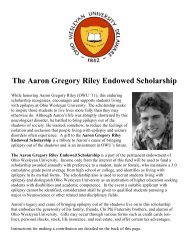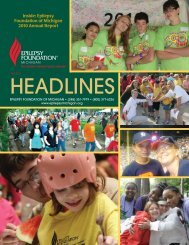Legal Rights of Children with Epilepsy in School & Child Care
Legal Rights of Children with Epilepsy in School & Child Care
Legal Rights of Children with Epilepsy in School & Child Care
Create successful ePaper yourself
Turn your PDF publications into a flip-book with our unique Google optimized e-Paper software.
CHAPTER TWO<br />
What Laws Apply to <strong><strong>Child</strong>ren</strong> <strong>with</strong> <strong>Epilepsy</strong>?<br />
Note: This chapter is a general <strong>in</strong>troduction to the relevant laws. Chapters 4 and 5<br />
discuss the application <strong>of</strong> these laws to children <strong>with</strong> epilepsy <strong>in</strong> detail.<br />
2.1Q:<br />
What are the primary laws that apply to children <strong>with</strong> epilepsy?<br />
A: Three laws <strong>in</strong> particular apply to children <strong>with</strong> epilepsy as well as children <strong>with</strong><br />
other disabilities. The Individuals <strong>with</strong> Disabilities Education Act (IDEA)<br />
governs the provision <strong>of</strong> early <strong>in</strong>tervention services to <strong>in</strong>fants and toddlers as<br />
well as education services to children ages three through 21. Section 504 <strong>of</strong> the<br />
Rehabilitation Act <strong>of</strong> 1973 (usually referred to simply as Section 504) is a<br />
general anti-discrim<strong>in</strong>ation law that prohibits disability discrim<strong>in</strong>ation <strong>in</strong><br />
federally funded and federally conducted programs and activities such as public<br />
schools. F<strong>in</strong>ally, the Americans <strong>with</strong> Disabilities Act (ADA) is a law that<br />
prohibits disability-based discrim<strong>in</strong>ation <strong>in</strong> state and local government activities<br />
such as parks and recreation programs and schools, and <strong>in</strong> programs and public<br />
accommodations such as bus<strong>in</strong>esses, child care programs and doctors’ <strong>of</strong>fices.<br />
2.2Q:<br />
What are the major provisions <strong>of</strong> the IDEA?<br />
A: The IDEA guarantees a “free appropriate public education” to children <strong>with</strong><br />
disabilities that “emphasizes special education and related services designed to<br />
meet their unique needs and prepare them for further education, employment,<br />
and <strong>in</strong>dependent liv<strong>in</strong>g.” 20 U.S.C.1401(d)(1)(A); 34 C.F.R.300.1. <strong><strong>Child</strong>ren</strong> are<br />
entitled to receive special education and related services <strong>in</strong> the least restrictive<br />
environment <strong>in</strong> which the services can be provided. The services are provided <strong>in</strong><br />
accordance <strong>with</strong> an <strong>in</strong>dividualized education program (IEP).<br />
2.3Q:<br />
What is a “free appropriate public education?”<br />
A: A free appropriate public education means special education and related services<br />
that are provided at public expense, under public supervision, at no cost to the<br />
child’s parent or guardian. These services must meet the standards <strong>of</strong> the state<br />
department <strong>of</strong> education, and the applicable requirements <strong>of</strong> the IDEA and its<br />
implement<strong>in</strong>g regulations, and must <strong>in</strong>clude an appropriate educational program<br />
for the child, provided <strong>in</strong> accord <strong>with</strong> the IEP. 20 U.S.C. 1401(a)(9); 34 C.F.R.<br />
300.17. Generally, an “appropriate” education has been found by courts to be<br />
one that enables children to make mean<strong>in</strong>gful educational progress. 7<br />
7 The sem<strong>in</strong>al case address<strong>in</strong>g this issue is Board <strong>of</strong> Education <strong>of</strong> the Hendrick Hudson Central <strong>School</strong><br />
District v. Rowley, 458 U.S 176 (1982), which held that the requirement <strong>of</strong> an appropriate education is<br />
satisfied when the student receives sufficient support services to benefit educationally from <strong>in</strong>struction. If<br />
the child is educated <strong>in</strong> the regular classroom, the child’s education is appropriate if the IEP is reasonably<br />
calculated to enable him or her to achieve pass<strong>in</strong>g marks and progress from grade to grade. Subsequent<br />
14








